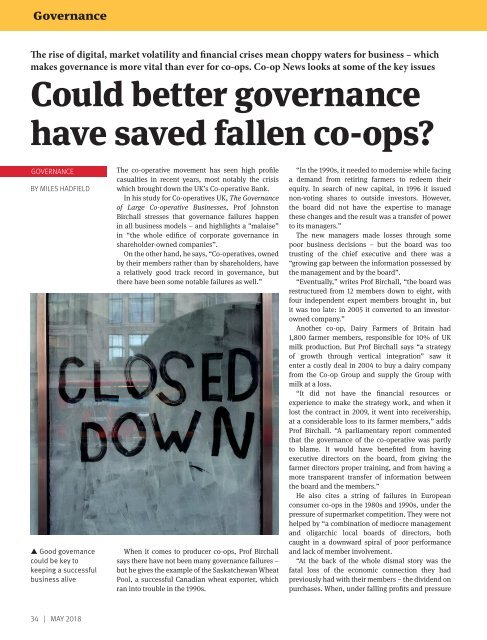MAY 2018
The May 2018 edition of Co-op News: connecting, challenging and championing the global co-operative movement. This issue shines a spotlight on governance – and how co-operatives do it differently. We also look at co-ops on the agenda in Westminster, sustainability supporting and preview some of the motions being put to the vote at the Co-op Group AGM.
The May 2018 edition of Co-op News: connecting, challenging and championing the global co-operative movement. This issue shines a spotlight on governance – and how co-operatives do it differently. We also look at co-ops on the agenda in Westminster, sustainability supporting and preview some of the motions being put to the vote at the Co-op Group AGM.
You also want an ePaper? Increase the reach of your titles
YUMPU automatically turns print PDFs into web optimized ePapers that Google loves.
The rise of digital, market volatility and financial crises mean choppy waters for business – which<br />
makes governance is more vital than ever for co-ops. Co-op News looks at some of the key issues<br />
Could better governance<br />
have saved fallen co-ops?<br />
GOVERNANCE<br />
BY MILES HADFIELD<br />
p Good governance<br />
could be key to<br />
keeping a successful<br />
business alive<br />
The co-operative movement has seen high profile<br />
casualties in recent years, most notably the crisis<br />
which brought down the UK’s Co-operative Bank.<br />
In his study for Co-operatives UK, The Governance<br />
of Large Co-operative Businesses, Prof Johnston<br />
Birchall stresses that governance failures happen<br />
in all business models – and highlights a "malaise”<br />
in “the whole edifice of corporate governance in<br />
shareholder-owned companies”.<br />
On the other hand, he says, “Co-operatives, owned<br />
by their members rather than by shareholders, have<br />
a relatively good track record in governance, but<br />
there have been some notable failures as well.”<br />
When it comes to producer co-ops, Prof Birchall<br />
says there have not been many governance failures –<br />
but he gives the example of the Saskatchewan Wheat<br />
Pool, a successful Canadian wheat exporter, which<br />
ran into trouble in the 1990s.<br />
“In the 1990s, it needed to modernise while facing<br />
a demand from retiring farmers to redeem their<br />
equity. In search of new capital, in 1996 it issued<br />
non-voting shares to outside investors. However,<br />
the board did not have the expertise to manage<br />
these changes and the result was a transfer of power<br />
to its managers.”<br />
The new managers made losses through some<br />
poor business decisions – but the board was too<br />
trusting of the chief executive and there was a<br />
“growing gap between the information possessed by<br />
the management and by the board”.<br />
“Eventually,” writes Prof Birchall, “the board was<br />
restructured from 12 members down to eight, with<br />
four independent expert members brought in, but<br />
it was too late: in 2005 it converted to an investorowned<br />
company.”<br />
Another co-op, Dairy Farmers of Britain had<br />
1,800 farmer members, responsible for 10% of UK<br />
milk production. But Prof Birchall says “a strategy<br />
of growth through vertical integration” saw it<br />
enter a costly deal in 2004 to buy a dairy company<br />
from the Co-op Group and supply the Group with<br />
milk at a loss.<br />
“It did not have the financial resources or<br />
experience to make the strategy work, and when it<br />
lost the contract in 2009, it went into receivership,<br />
at a considerable loss to its farmer members,” adds<br />
Prof Birchall. “A parliamentary report commented<br />
that the governance of the co-operative was partly<br />
to blame. It would have benefited from having<br />
executive directors on the board, from giving the<br />
farmer directors proper training, and from having a<br />
more transparent transfer of information between<br />
the board and the members.”<br />
He also cites a string of failures in European<br />
consumer co-ops in the 1980s and 1990s, under the<br />
pressure of supermarket competition. They were not<br />
helped by “a combination of mediocre management<br />
and oligarchic local boards of directors, both<br />
caught in a downward spiral of poor performance<br />
and lack of member involvement.<br />
“At the back of the whole dismal story was the<br />
fatal loss of the economic connection they had<br />
previously had with their members – the dividend on<br />
purchases. When, under falling profits and pressure<br />
34 | <strong>MAY</strong> <strong>2018</strong>


















